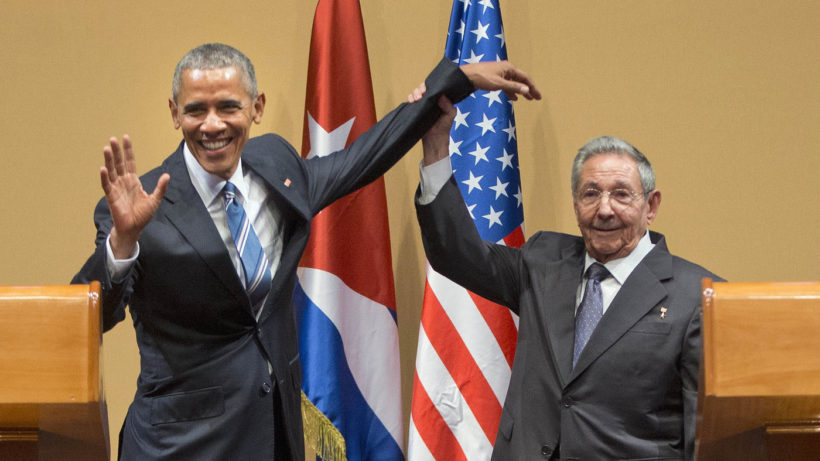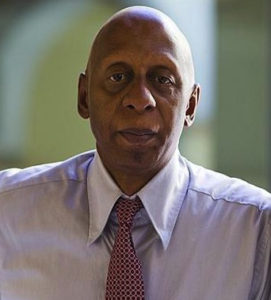Cuba arrests dozens of human rights protesters before Obama’s arrival
Daily News Article — Posted on March 22, 2016
LADIES IN WHITE (Damas de Blanco) was founded in Cuba in 2003 by wives and other female relatives of jailed dissidents. The women protest the imprisonments by attending Mass each Sunday wearing white dresses and then silently walking through the streets dressed in white clothing. The color white is chosen to symbolize peace.
(by Alan Gomez, USA Today) HAVANA — Just hours before President Obama landed Sunday in Cuba for his historic visit to the communist island, Cuban authorities arrested more than 50 dissidents who were marching for improved human rights.
Members of the group, known as the Ladies in White…march peacefully each Sunday after Mass at a church in a suburb of Havana called Miramar and usually get arrested and detained for hours or days.
Some in the group thought Cuban authorities would back off this Sunday out of respect for Obama’s visit. Before getting arrested, Berta Soler, one of the founding members who has been marching since 2003, said while walking to the church Sunday morning that maybe they would be allowed to protest without getting arrested.
“Everything looks good so far,” she said.
Despite dozens of international reporters in town for Obama’s trip, the group was quickly rounded up in buses and police cars.
“For us, it’s very important that we do this so President Obama knows that there are women here fighting for the liberty of political prisoners,” Soler said before being arrested. “And he needs to know that we are here being repressed simply for exercising our right to express ourselves and manifest in a non-violent way.”
Obama’s three-day trip to Cuba is to highlight the new relationship [he has established through executive action with our] Cold War foes. After more than five decades of political and economic isolation, President Obama and Cuba’s Communist dictator Raul Castro announced in December 2014 that they would re-establish diplomatic relations. Embassies have since reopened in Havana and Washington, U.S. cellphones can be used in Cuba, U.S. airlines are planning direct flights to the island, and several U.S. companies have struck deals to trade with Cuba. [There is no word on the fate of Cubans unjustly imprisoned for political or religious reasons.]

Raúl Castro lifts up President Obama’s arm at the conclusion of Monday’s joint news conference at the Palace of the Revolution in Havana.
Obama is expected to embrace those changes during his trip, but the issue of human rights has been the most difficult negotiating point leading up to his visit. Secretary of State John Kerry was supposed to visit the island ahead of Obama’s trip but canceled because of disagreements over whom he could meet with.
The White House has said that Obama will meet with a group of dissidents on Tuesday, but several have said they’re unsure whether they’ll be [permitted by the repressive regime] to attend.

Guillermo Farinas
Guillermo Farinas, a leading voice in Cuba’s civil rights movement who is part of the group that could meet Obama, is camped out at a friend’s house this week because he said Cuban authorities have ordered him to be on house arrest. He said many other dissidents like him are being blockaded in their homes ahead of Obama’s visit. Because of that, he said Obama has a “moral responsibility” to strongly criticize Cuba’s human rights record and push the government to improve before the U.S. further expands its relationship with Cuba.
“The most important thing for us is that President Obama doesn’t allow the Cuban government to use his visit to create an image of complicity with the actions of the totalitarian regime,” Farinas said.
The Communist Cuban government declined to comment on Farinas’ claim that he and other dissidents were under house arrest.
Before Sunday’s arrests began, some Cubans [who are favored by the communist regime] came out to shout down the Ladies in White, accusing them of being U.S.-funded protestors with no grounds to complain about their situation in Cuba.
…Felipe Hernandez Serrano shouted at the ladies as they prepared for their march. Serrano is the head of his neighborhood’s Committee for the Defense of the Revolution, an organization which supports the repressive Castro regime, that critics say is designed to spy on neighbors. Members of the group describe it as a “community organization”. Serrano called the [Ladies in White] “delinquents” and defended the communist government’s right to arrest them when they [protest for basic freedom and human rights].
Elizardo Sanchez, head of the Cuban Commission on Human Rights and National Reconciliation, said from his home Saturday that he hoped Obama would deliver a strong message to the Cubans. His commission has documented a rise in arrests following Cuba’s opening with the U.S. so he said he has no reason to think the arrests will stop just because Obama was coming to town.
“Neither President Obama, nor the Cuban people, expect spectacular changes,” Sanchez said. “These kinds of regimes are repressive. [Controlling the people] is necessary to maintain their power. So no matter what Obama says or does, it’s impossible to put a good face on the human rights situation here in Cuba.”
Reprinted here for educational purposes only. May not be reproduced on other websites without permission from USA Today.
- Although President Obama has called for human rights reforms to be imparted before lifting sanctions against the country, human rights activist have seen an increase in repression from the Castro regime.
- There were more than 8,600 political arrests documented by the Cuban Commission for Human Rights and National Reconciliation in Cuba over the course of 2015. There was a sharp increase in such arrests since 2013.
- While the Cuban government released 53 political prisoners as part of the terms of an agreement with the United States, five of them have since been re-arrested. (from the liberal blog thinkprogress .org.)
Background
- President Obama announced on Dec. 17, 2014 that the U.S. would restore full diplomatic relations with Cuba, ending a half-century of Cold War estrangement with the Communist nation. This was the result of 18 months of secret talks between the Obama administration and Cuba's Communist regime. The sudden and shocking change in policy was announced simultaneously by Obama in Washington and Cuban President Raul Castro in Havana after a phone call between the two leaders.
- As part of the policy shift, President Obama is easing restrictions on travel to Cuba, including for family visits, official government business and educational activities, and he is seeking to expand economic ties.
- It all represents an undertaking by Obama without Congress’ authorization as he begins the final years of his presidency.
- The U.S., he said, will establish an embassy in Havana, where the old one was shuttered in January 1961 after the revolution that brought Fidel Castro to power on Jan. 1, 1959.
- After Obama’s 2012 reelection, he met with advisers and asked them to “think big” about a second-term agenda, including the possibilities of new starts with longstanding U.S. foes such as Iran and Cuba, The Associated Press reported.
- But the announcement was greeted with skepticism and disdain by those opposing liberalized contact with communist Cuba. Sen. Robert Menendez (D-N.J.), who heads the Senate Foreign Relations Committee, also denounced the rapprochement. “Today’s policy announcement is misguided and fails to understand the nature of the regime in Cuba that has exerted its authoritarian power over the Cuban people for 55 years,” said Menendez, the son of Cuban immigrants. (from nydailynews, posted at a Jan. 2015 StudentNewsDaily post)
